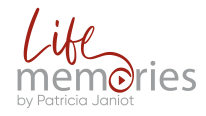I am on this mission so that people don’t end up regretting, as I did, not interviewing my father before he passed away unexpectedly, thinking I could do it later in the future. This will happen to billions of people around the world. Sooner or later, they will regret letting those stories, which were part of their family legacy, disappear.
Family stories are an invaluable treasure that often gets lost over time. Most people forget that their lives are filled with memories, successes, failures, challenges, lessons, advice, and wisdom that can enrich future generations. According to an AARP study, 70% of people over 60 want to share their memories with the next generations, but only 30% actually do.
Creating a family legacy documentary is one of the most effective ways to preserve these stories. Speaking directly to the camera and sharing your life experiences, family traditions, and values ensures that your legacy is not lost but passed down authentically and emotionally.
What is the only inevitable certainty in life? That we are all going to die!
And despite that certainty, in some way, there is a way to avoid it. “They may eliminate men, but they cannot eliminate their ideas,” as the renowned Colombian politician Luis Carlos Galán once said. You can kill the messenger, but not the message. We must aspire to immortality through personal storytelling.
This is how Life Memories was born—a project I started to produce private documentaries about personal, family, and business legacies. These biographical videos are another way of building a verbal and emotional inheritance. Another way of leaving a mark and transcending.
There are many ways to do this. Many people document their lives daily on social media, but that is the “perfect” life—the one we know isn’t real or truly authentic.
Others write books, but not everyone is a skilled writer capable of captivating readers. So, sometimes, these efforts don’t achieve much success. However, with the magic of audiovisual storytelling, you have the chance to see that person you love and admire, to hear them, to feel them. Why? Because the brain processes visual information 60,000 times fasterthan it reads text. You don’t have to imagine it—you have your loved one right in front of you, speaking in their own voice, with the strength of their memories and teachings to inspire us.
Where to Begin?
In the past, photo albums, along with stories narrated by parents, uncles, and grandparents, held the history of a family in one place. We should return to that practice, using technology to store photos, videos, stories, descriptions, and memories in one place. You should gather all your audiovisual material and digitize it—on a drive, in the cloud, or on a hard drive.

Today, paradoxically, even though cell phones make it easier to take and store photos, it seems harder than ever to find them. Often, those photos and experiences are spread across multiple devices—new and old phones, family members’ and friends’ mobile phones—filled with memories and images we rarely revisit.
We can start documenting those stories, taking notes as accurately as possible to ensure we don’t forget past events and present experiences as they unfold. Sometimes, the most practical way is to record voice notes that capture details and describe situations we’ve lived through. There’s a difference between recalling something years later with hindsight and recording your feelings in the moment when an experience impacts you.
Of all the material you could gather to create your own biopic or one for a loved one, the most important element is the interview. With the right questions and active listening, you will uncover the meaningful details worth sharing. The richness of human existence lies in those details. Often, family and friends know what happened, but we forget to ask howit happened—especially how they felt and what they learned from each situation. That’s where the magic of follow-up questions comes in.
When I produce these biographical documentaries, I use a questionnaire with dozens of questions—some of which I wish I had asked my father. You can ask them to your loved ones if you still have time.
You will be surprised by the stories you’ve never heard before.
For example:
- Do you remember a favor someone did for you or an act of generosity that you have been grateful for your entire life?
- If you had a time machine and could speak to yourself at 20 or 30 years old, what advice would you give?
- Do you recall a problem that taught you a great life lesson?
- Have you fulfilled your purpose in life? What is your legacy?
These are simple yet profound questions, and the answers help build a story—ideally, an audiovisual one—that will become even more valuable when we are no longer here. It will be the greatest gift of love to the most important people in our lives.
That legacy of wisdom, experiences, and above all, values is just as—if not more—important than the inheritance left in bank accounts or properties.
And you don’t have to wait until you’re 80 years old to start. The best thing about thinking about your legacy and memories early in life is that, through the process, you realize you still have time to improve the third act of your life. You can aspire to new and noble purposes so that, in the end, the balance of your life turns out even better than you had imagined.
A Piece of Advice: Start Today
Begin recording important anecdotes and key reflections that could be part of a future documentary. Never underestimate the power of your memories.
And you—have you started documenting your life yet?
What are you waiting for?
Get rid of the thought that your life isn’t interesting… because we all have a story to tell.
Make sure you are the one who tells your own story.
That way, it will be impossible to forget you.



